AHI 001B Medieval and Renaissance Art
Location: Lecture Everson Hall 157
Time: T,R 10:00-11:20 AM
Instructor: Lopez, John
- Section A01 (CRN: 10596); T 3:10-4:00 PM - Everson Hall 157
- Section A02 (CRN: 10597); M 4:10-5:00 PM - Everson Hall 157
- Section A03 (CRN: 10598); M 2:10-3:00 PM - Everson Hall 157
- Section A04 (CRN: 10599); W 9:00-9:50 PM- Everson Hall 157
- Section A05 (CRN: 10560); W 2:10-3:00 PM- Everson Hall 157
- Section A06 (CRN: 10561); W 1:10-2:00 PM - Everson Hall 157
COM 002 Major Works of the Medieval and Early Modern World
Section 001 (CRN: 16591)
Location: Wickson Hall 1038
Time: M,W 10:00-11:50 AM
Instructor: The staff
Section 002 (CRN: 16592)
Location: Wellman Hall 003
Time: T,R 2:10-4:00 PM
Instructor: The staff
Section 003 (CRN: 16593)
Location: Veihmeyer Hall 116
Time: T,R 12:10-2:00 PM
Instructor: Sell, Sean
COM 005 Fairy Tales, Fables & Parables
Location: Lecture Olson Hall 205
Time: T,R 12:10-1:30 PM
Instructor: Sharlet, Jocelyn
- Section A01 (CRN: 16600); W 6:10-7:00 PM - Wellman Hall 7
- Section A02 (CRN: 16601); w 7:10-8:00 PM - Wellman Hall 105
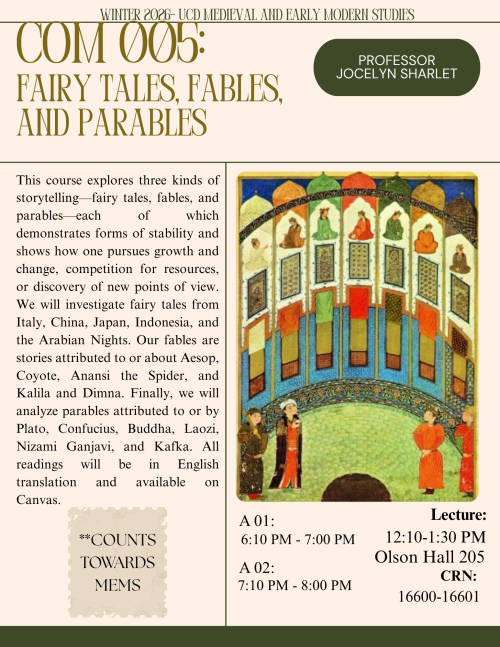
ENL 10A Literatures in English I: To 1700
Location: Lecture Olson Hall 118
Time: T,R 9:00-10:20 AM
Instructor: Waters, Claire
- Section A01 (CRN: 21187); R 6:10-7:00 PM - Wellman Hall 005
- Section A02 (CRN: 21188); R 7:10-8:00 PM - Social Science and Humanities 70
- Section A03 (CRN: 21189); F 8:00-8:50 AM- Wellman Hall 129
- Section A04 (CRN: 21190); F 9:00-9:50 AM - Wellman Hall 129
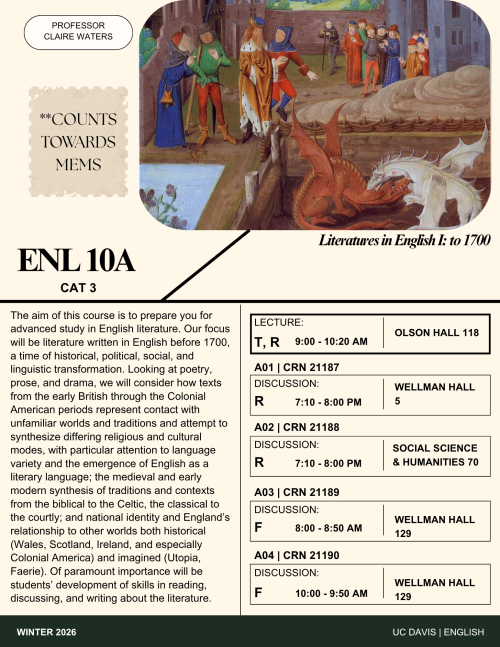
ENL 113A Chaucer: Troilus & the "Minor" Poems
Location: Lecture Wellman Hall 119
Time: T,R 12:10-1:30 PM
Instructor: Chaganti, Seeta
- Section A01 (CRN: 40285); R 6:10-7:00 PM- Olson Hall 159
- Section A02 (CRN: 40286); R 7:10-8:00 PM - Olson Hall 159
- Section A03 (CRN: 40287); F 8:00-8:50 AM - Olson Hall 244
- Section A04 (CRN: 40288); F 9:00-9:50 - Olson Hall 244
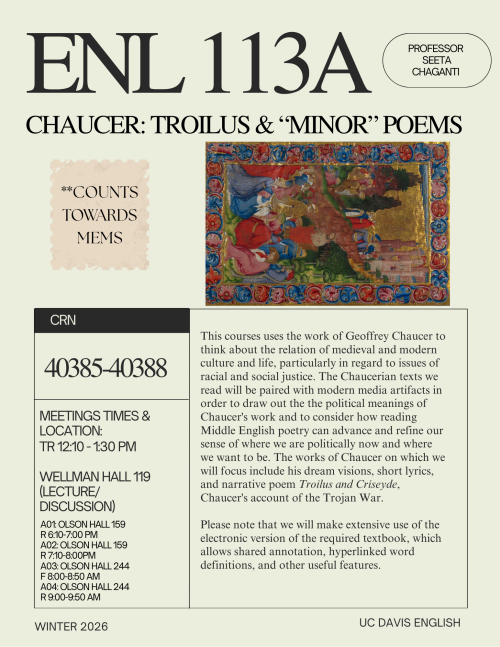
ENL 189 Seminar in Literary Studies*
Section 001 (CRN: 21349)
Location: Edwards Family Athletic Center 1011
Time: T,R 1:40-3:00 PM
Instructor: Chaganti, Seeta
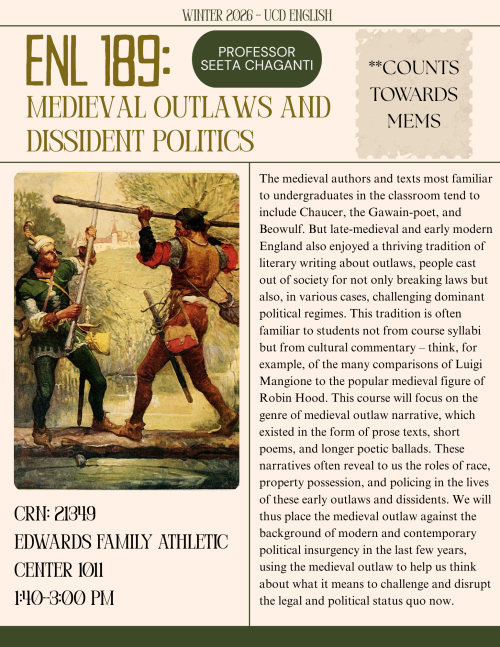
HIS 102D Love, Sex and Gender in Premodern Europe
Section 001 (CRN: 25595)
Location: Lecture Social Sciences and Humanities 4202
Time: T 12:10-3:00 PM
Instructor: Stuart, Kathy
We study ideas about love, sex and gender as they impacted people’s lived experience from late antiquity through the eighteenth century. In the Middle Ages a couple did not need clergy or witnesses to get married. They could simply consummate the marriage by having sex. State and church set out to suppress such clandestine marriages by the sixteenth century, in order to impose control over the sexuality of their subjects. Sex out of wedlock, prostitution, and same-sex relationships, widely tolerated in late antiquity and the Middle Ages became criminalized in the early modern period. We explore how and why these changes occurred and how they intersected with religion, class, ethnicity, religion and class. Why did early modern people believe that Jewish men menstruated? Why was sex with Satan a necessary legal element of the crime of witchcraft? Why were Renaissance medical textbooks full of examples of women spontaneously turning into men, but a man turning into a woman was considered medically impossible? How was the emergence of a modern “gay” identity in the late eighteenth century related to the development of the modern heterosexual male, which happened at the same time?
Intensive reading and analysis of primary and secondary sources. c. 200-300 pages per week.
Assessment based on informed class discussion of assigned readings, 2 short papers and 8-10 page final paper.
HIS 132 Crime and Punishment in Early Modern Europe
Section 001 (CRN: 25625)
Location: Lecture TLC 2215
Time: T,R 4:40-6:00 PM
Instructor: Stuart, Kathy
HIS 136 The Scientific revolution
Section 001 (CRN: 25625)
Location: Lecture TLC 2218
Time: T,R 12:10-1:30 PM
Instructor: Stolzenberg, Daniel
What does it mean to understand nature in modern—and pre-modern—ways? Today we take for granted that science involves mathematical laws, experimentation, discovering new phenomena, and the creation of technologies that provide power over nature. None of these was true about European natural science in 1500. All had become widely accepted by 1700. This class treats the transformation of European ideas about nature, knowledge, and technology during the age of Copernicus, Galileo, Descartes, and Newton. We will explore the intellectual culture of the sixteenth and seventeenth centuries to examine issues such as scientific methods, instruments and experimentation, science and religion, and the control of nature. Topics include astronomy, physics, chemistry/alchemy, natural magic, medicine, and natural history. Evaluation is based on short writing assignments, quizzes, and essays. This course satisfies GE requirements for AH, SS, and WC. There are no prerequisites, and no prior knowledge is necessary.
Readings: Peter Dear, Revolutionizing the Sciences, and miscellaneous primary sources
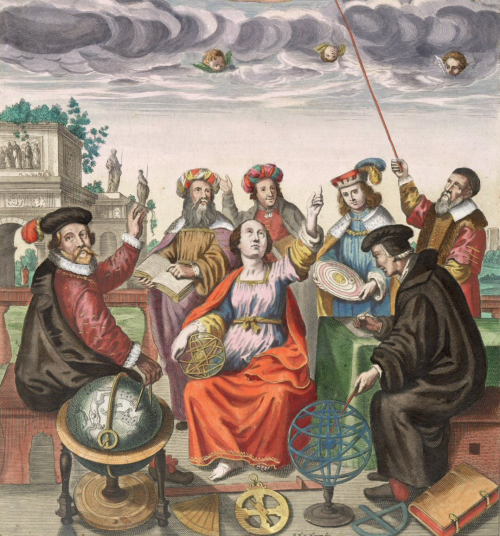
GER 120 Survey of German Culture
Section 001 (CRN: 40659)
Location: Lecture Wellman Hall 102
Time: T,R 3:10-4:30 PM
Instructor: Zhang, Chunjie
PHI 145 Philosophy of the Middle Ages
Section 001 (CRN: 41223)
Location: Lecture TLC 3210
Time: T,R 1:40-3:00 PM
Instructor: Szaif, Jan
SPA 130 Survey of Spanish Literature to 1700
Section 001 (CRN: 41471)
Location: Lecture Bainer Hall 1060
Time: M,W,F 1:10-2:00 PM
Instructor: Gutiérrez-Flores, Daniela
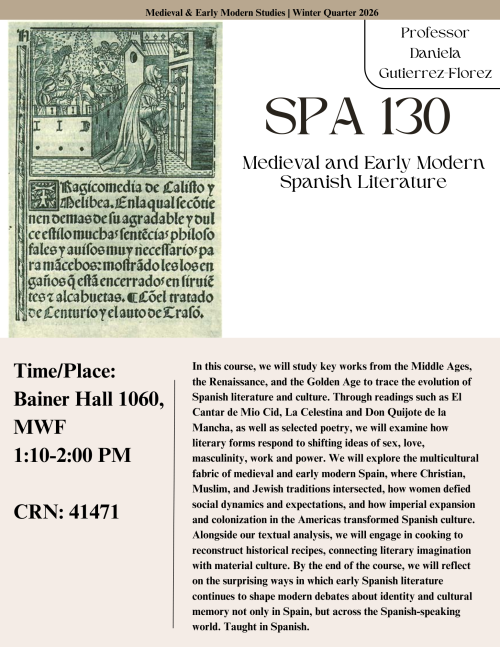
LAT 108 Horace: Satires & Epistles
Section 001 (CRN: 41069)
Location: Lecture TLC 3212
Time: M,W,F 2:10-3:00 PM
Instructor: Seal, Carey
LAT 118 Roman Historians
Section 001 (CRN: 41070)
Location: Lecture Wellman Hall 123
Time: M,W,F 12:10-1:00 PM
Instructor: Chin, Mike
MSA 100 Middle East and South Asia: Comparative Perspectives Scientific Revolution
Section 001 (CRN: 30084)
Location: Lecture Social Sciences and Humanities Hall 80
Time: T,R 3:10-4:30 PM
Instructor: Sen, Sudipta
REL 159 Mahabharata
Section 001 (CRN: 40819)
Time: T,R 4:40-6:00 PM
Instructor: Dhanani, Lynna

CHN 110 Great Writers of China: Texts & Context (in English)
Section 001 (CRN: 16096)
Location: Lecture TLC 3213
Time: T,R 2:10-4:00 PM
Instructor: He, Yuming
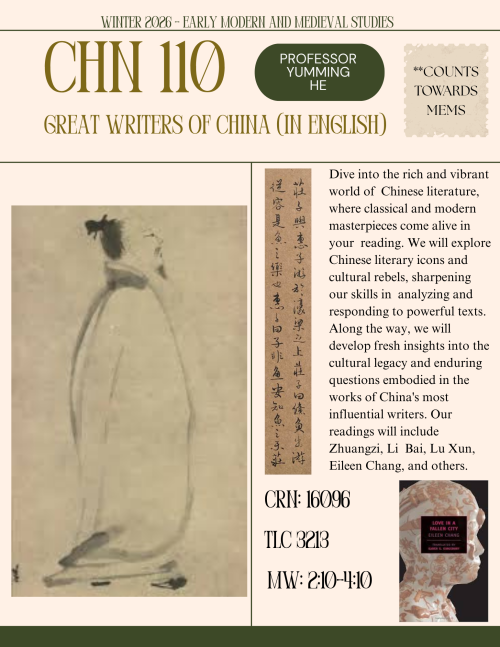
CHN 130 Readings in Traditional Chinese Fiction
Section 001 (CRN: 41023)
Location: Lecture TLC 3213
Time: T,R 12:10-2:00 PM
Instructor: He, Yuming
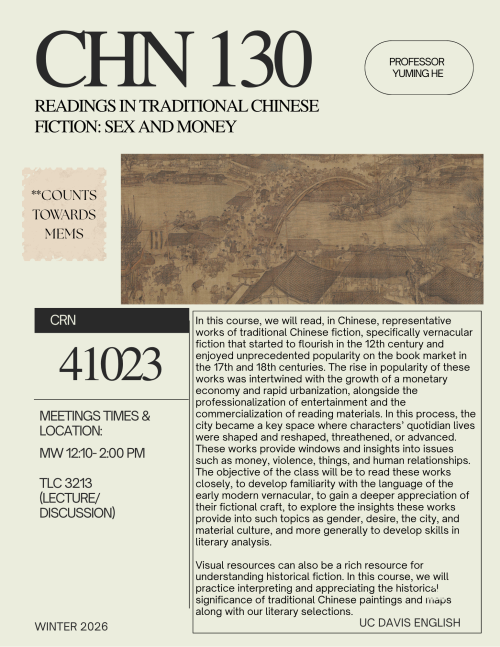
JPN 102 Medieval Japanese Literature*
Section 001 (CRN: 27262)
Location: Lecture Hoagland 168
Time: M,W 10-12 PM
*This course can only be taken with permission from the MEMS Director. Please fill out the MEMS Request for Course Credit to be Counted for the Major or Minor.pdf